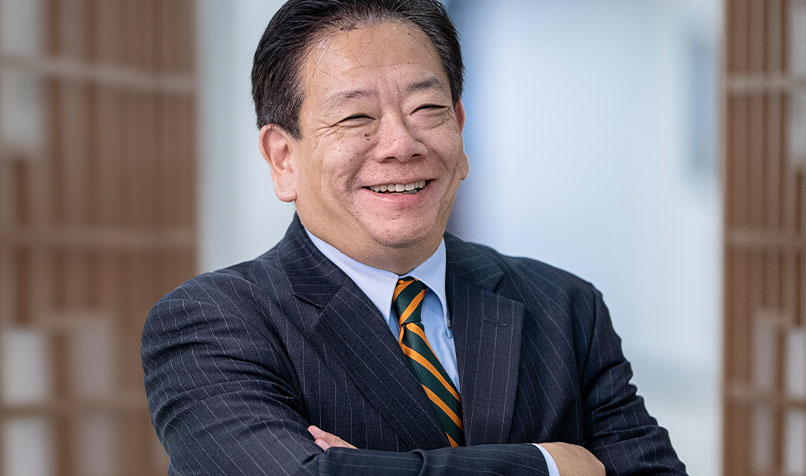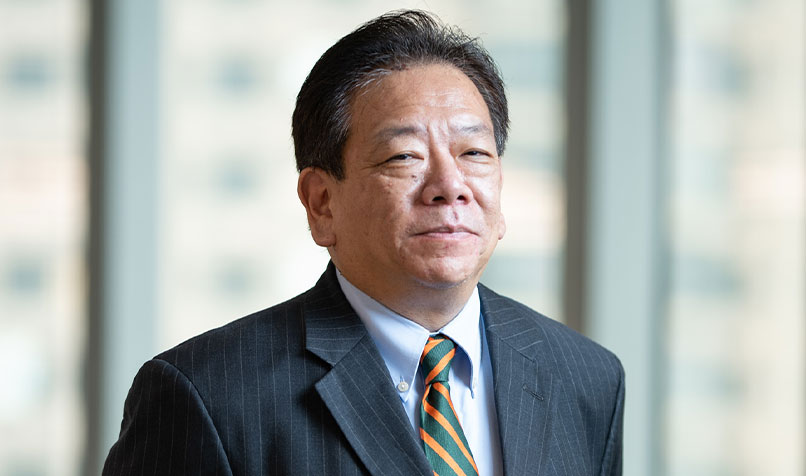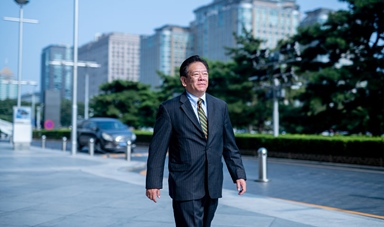Loading component...
At a glance
- Len Jui FCPA is deputy chair of the International Auditing and Assurance Standards Board (IAASB) and KPMG’s Asia-Pacific lead on public policy and regulatory affairs.
- Prior to joining the IAASB, Jui worked with regulators from around the globe as part of his role with the US Securities and Exchange Commission’s Office of the Chief Accountant.
- Jui is an avid photographer, and nurtures his interest when travelling for his work.
As we speak over a video call for this story, Len Jui FCPA is grounded in Mainland China.
The deputy chair of the International Auditing and Assurance Standards Board (IAASB) arrived in Beijing in July 2020 from the US on a regular visit in his role as KPMG’s Asia-Pacific lead on public policy and regulatory affairs. He has been unable to leave since, because of COVID-19 travel restrictions.
Jui’s family – his wife and two adult children – are in Washington, DC. His elderly mother is in Florida, and he is not sure when he will see her next. That’s OK, Jui says undaunted, it’s par for the course. While his life to date has rarely involved staying in one place for long, Jui is making the most of his time in Beijing, just as he has in many other places during his life.
That is because he has known from a very young age that diversity of experience is typically a positive.
Taking life in his stride
In the mid-1970s, when Jui was just 13 years old and living in Taiwan, his parents decided that greater diversity of life experience would be beneficial for their son. He spent the following five years at a boarding school in the UK.
It is easy to assume that such an experience would be highly stressful, or perhaps even emotionally devastating, for such a young boy. Jui, however, took it all in his stride, considering it a wondrous adventure – just as he is treating his extended Beijing stay several decades later.
“I guess I was too young – or too stupid – to recognise the pressure,” Jui smiles. “I just embraced the experience. I knew people who felt a lot of stress at a young age for various reasons, but I didn’t feel any of that.
“I was in a small village in England, where there was no diversity. I was probably the only East Asian person there. While I knew I was different, I didn’t feel any pressure.
“For my first year, I barely spoke a word of English, so I couldn’t go to school. I ended up living that year with a retired couple, both over 75, who had lived through both world wars and numerous economic recessions.”
The couple sat with Jui every morning to teach him English. They put a book in his hand and asked him to read by repeating what they said. At first, there was no emphasis on understanding the words, just on pronunciation and tone of voice.
“They protected me,” he says. “They took me out every day, but kept me sheltered. They’d take me out to the countryside to have a picnic and kept me away from anything bad. So, maybe for that reason I just didn’t know how different I was.
“They were such nice people, and I took so much from their stories of hardship, of world wars, of bombings, of food rationing and the deaths of their kids and their grandkids. I was a teenager, somebody who knew nothing. They had been through so much hardship, so they had a wealth of knowledge. It was such an amazing experience.”
Audit opens up the world

All of the change and movement in his early life led to Jui suffering a severe case of “itchy feet” as an adult. He is the first to admit to having little patience for staying in one role, one office, one country, throughout his life and career.
After finishing his schooling in England, he relocated to Miami in the US, where his parents had also moved permanently.
The move caused some initial concern for Jui. He was still a young Taiwanese man, who had become familiar with British culture during the 1970s, and who was now throwing himself into another new and untested environment.
“In England and Europe in the late 1970s, there was a lot of anti-US sentiment,” he recalls. “I was going from a boarding school in a small village in the middle of nowhere in the UK to Miami, a place where the sun shines all the time, people dress differently, and there are numerous different accents, because in downtown Miami, it’s 60 per cent immigrants from Latin America and Haiti and Jamaica. So, it was quite a different environment.”
It was in Miami that Jui studied for his first university degree, which you’d probably think would be accounting related, but you’d be wrong. Jui’s passion was for the fine arts, and his degree focused on photography.
“That’s something I really wanted to do, and that I still do,” he says. “To travel around the world taking pictures of people, objects and shadows – while appreciating the local culture, history and society and talking to people – was a passion.”
Artist and realist
“After I fulfilled my personal goal, the reality was that I had to make a living,” Jui says. “I chose accounting, and auditing specifically, because of the mobility it offered. It’s a little ironic, but auditing is something that can take you away from a desk job, away from sitting in an office. It can enable you to travel around the world, because business is so much more internationalised. And, while I travel, I can take my camera and take photos.”
After graduating from the University of Miami with a master of business administration in accounting, Jui knew he’d likely have to spend five or six years in a major accounting firm to earn his auditing stripes, before getting a chance to travel. “But I wasn’t a very patient person,” he says.
In his first job with EY, his clients were hospitals, old people’s homes and medical clinics – not exactly global, glamour businesses. He fed his obsession with international matters by reading The Economist. One day, he saw an ad in the magazine for auditors required by Arthur Andersen’s Shanghai office. He applied and got the job.
Jui had not been back to Asia since he left as a teenager. “It was a real culture shock for me,” he says. “I looked like everybody else, but I didn’t behave like everybody else.”
However, just as he’d done several times in the past, Jui wholeheartedly threw himself into learning and experiencing a new culture.
Eight years in China were followed by a role with the US Government’s capital markets securities regulator, the US Securities and Exchange Commission (SEC). In his role as the associate chief accountant in the SEC’s Office of the Chief Accountant in Washington, DC, Jui was able to work with regulators around the globe.
This exposure led to his being appointed to the IAASB, first as a technical adviser on the IAASB and International Federation of Accountants board, and currently as the organisation’s deputy chair. He is also a member of the ChiNext Board Listing Committee with the Shenzhen Stock Exchange and a member of CPA Australia’s Centre of Excellence for External Reporting.
Where in the world is audit heading?

Jui’s varied roles have given him a unique view over the audit function, including its current and future states.
The pace of change in audit, as in almost every other facet of accounting, is accelerating dramatically, Jui says. This is partly because technology has changed, but also because of the pace of globalisation.
“We think about accounting and auditing as a lot of numbers, a lot of books and records on paper,” Jui says.
“But now you can do a business transaction from your phone. You can do your banking or order takeaway from an app. That information is not paper-based any more. It is in the cloud, in a database somewhere.”
This means that such data, like Jui’s career, is borderless. It can travel and be accessed from anywhere.
It may no longer only be restricted by national rules and shaped by national frameworks, but instead is part of a new, global accounting order. This is why auditors need to change their mindset.
“Accounting has been such a traditional, conservative type of profession for such a long time,” Jui says. “An accountant has traditionally gone through an apprentice type of process, spending 10 to 15 years in a firm to become a partner.
"Audit as a profession is about protecting the public, so we will always need public trust. To achieve that in a global environment, we need people speaking the same language."
“But people now, particularly the younger generations, don’t have the patience to be sitting for five or 10 years in a desk job. Now, people are more innovative. They want to be creative.
"They want a work–life balance and they want life experience.”
The new world of audit – where auditors must learn about and adjust to different practices, laws, regulations and standards across numerous jurisdictions – is one that offers such experience.
Jui says at present, 130 of 200-plus jurisdictions are using the International Standards on Auditing, and 70-plus jurisdictions, mostly developing countries, are not. “But the largest economies in the world, and the majority of countries, are using international standards.
If we’re playing in a global economy, we all should be applying the same standards.
“Audit as a profession is about protecting the public, so we will always need public trust. To achieve that in a global environment, we need people speaking the same language.
“I think of it the same way I think of photography. When you take a picture, it seems very transparent, and it seems as if it represents reality. But you can take pictures from different angles, making things look different.
“A different perception, shadow and highlights might distort the reality of what we’re looking at. Financial information is no different.
"The future of audit is about ensuring all photographers shoot the same way, through the same lens, producing clear and consistent realities.”

